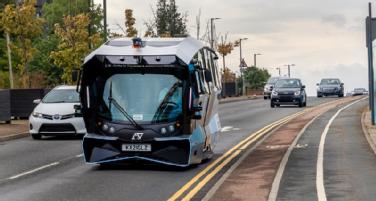Last modified on October 19, 2023

New project looking into the feasibility of a self-driving shuttle service in the West Midlands
The project, co-funded by the Centre for Connected and Autonomous Vehicles’ Commercialising Connected and Automated Mobility programme, will explore how to incorporate automated vehicles into the existing transport infrastructure.
The feasibility study will consider all aspects of the technology required in order to operate a safe and reliable automated public transport service between Blythe Valley Business Park and the new HS2 rail station in Solihull, using the existing road network.
“We’ve already carried out a series of successful pathfinder trials here in Solihull, using our own automated shuttle. We are now taking the next step and undertaking the vital feasibility work necessary in order to start thinking about more ambitious deployments and establishing new commercial public transport services”, said Cllr Ken Hawkins from the Solihull Council Cabinet for Environment & Infrastructure.
Jonathan Smith, Midlands Future Mobility Programme Manager, added: “The business case for scaling new mobility solutions is complex. It involves a granular understanding of the use case, safety, users, operations, and infrastructure.” To address these questions, the project brings together a group of diverse experts from WMG (University of Warwick), Solihull Council, National Highways, Transport for West Midlands, ZF, Aurrigo, Syselek and Liftango.
The outcomes from the study will inform self-driving mobility challenges and business cases, not just in Solihull but in the UK as a whole.
Source: The original article can be found here


